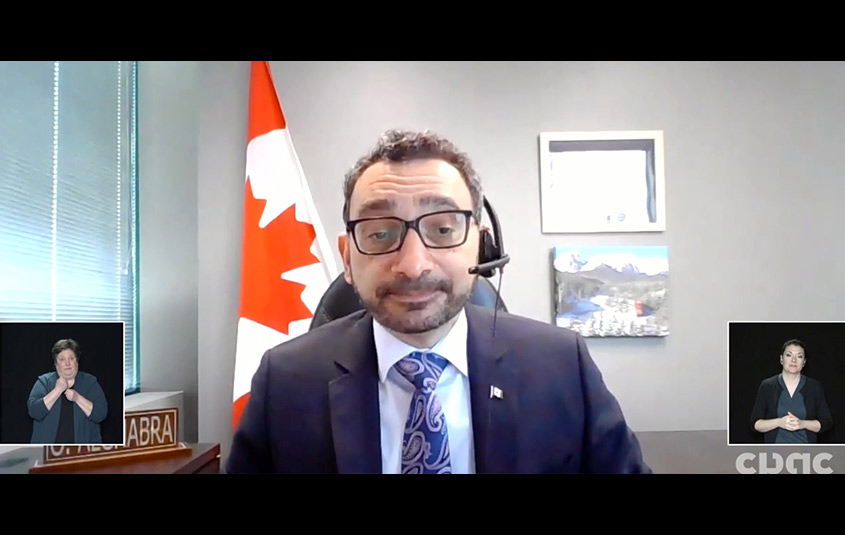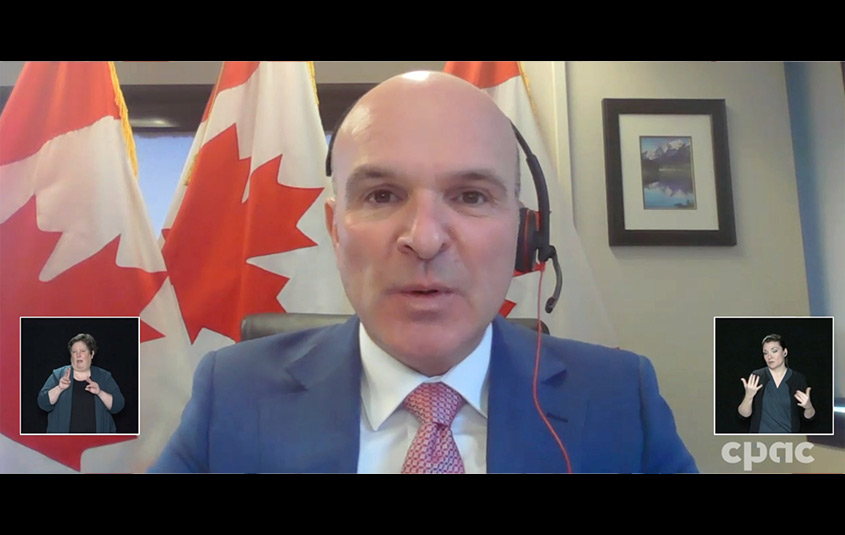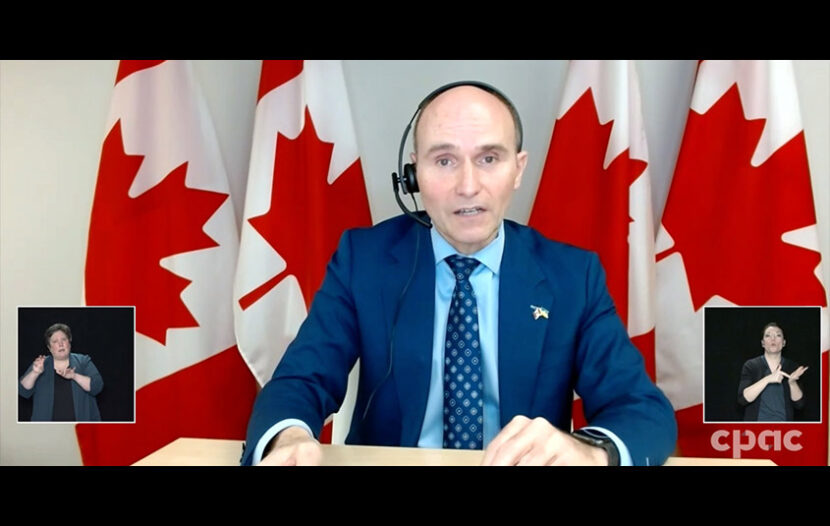TORONTO — The long-awaited day has finally come.
As announced this morning, effective April 1, 2022 the federal government is dropping the pre-arrival COVID testing requirement for fully vaccinated travellers arriving in Canada.
The retail travel industry is still in dire need of extended financial aid.
However the elimination of pre-arrival testing for clients returning to Canada marks the lifting of the last major hurdle for travel’s recovery, after two years of pandemic restrictions.
This morning’s news followed widely circulated reports yesterday that cited sources close to the issue saying the announcement would come today.

Transport Minister Omar Alghabra, March 17, 2022
Health Minister Jean-Yves Duclos was joined by Transport Minister Omar Alghabra and Tourism Minister Randy Boissonnault for today’s briefing.
Said Minister Duclos today: “We are in a much better position now in March 2022 than we were in March 2020. We have more tools available now, like the wide availability of rapid test, and a range of treatments … we are now entering into a transition phase. Today’s announcement is encouraging. But I must also remind you that all measures are subject to review.”
Fully vaccinated travellers may still be randomly tested upon arrival, however they no longer need to quarantine while waiting for the results. Unvaccinated and partially vaccinated travellers must still submit negative pre-arrival PCR test results.
All travellers must also continue to use the ArriveCAN app.
Current travel measures in effect since Feb. 28 require negative rapid antigen test results within 24 hours, for travellers coming into or returning to Canada.
“TODAY IS THE DAY”
“Today is the day many of us have been waiting for,” said Transport Minister Omar Alghabra this morning. “It is a great day for Canadian travellers, tourism and aviation. This is good news. All along we said we would adjust our border measures based on public health recommendations. And that is exactly what we’re doing today.”
Minister Alghabra added: “As Minister Duclos noted, the revised border measures we’re announcing today are possible thanks to the millions of Canadians who have stepped up, rolled up their sleeves and gotten vaccinated.”
He noted that Canada’s requirement that all air, rail and cruise ship passengers be vaccinated against COVID-19 still stands, as is the masking rule in Canadian airports and on airplanes. “But as we’ve always said, public health measures are temporary, and we will adjust them based on public health recommendations.”

Tourism Minister Randy Boissonneault, March 17, 2022
Tourism Minister Randy Boissonnault spoke to Canada’s tourism industry. “My friends, the time has finally come. Canada’s tourism sector is ready to ensure the safety of travellers, employers and the communities in which they operate.”
CRUISE SHIP PASSENGER UPDATE
Minister Alghabra addressed testing requirements for cruise ship passengers, in the wake of the eased travel advisory for cruise ship travel announced earlier this month.
Cruise ship passengers will need to show negative results from a rapid antigen test no more than one day prior to their ship’s departure. However they will no longer be required to be tested again before getting off the ship.
AIR CANADA WELCOMES ANNOUNCEMENT
Air Canada immediately issued a statement saying it welcomes the Government of Canada’s announcement to remove pre-departure testing requirements as of April 1, 2022 for fully vaccinated travellers entering Canada.
“Today’s announcement by the federal government is excellent news for the entire travel and tourism industry, which are important contributors to the Canadian economy. People are eager to travel and reconnect with their loved ones, and the end of pre-departure testing will provide travellers with more certainty, allowing them to plan their next trip with more confidence and without the worry of incurring additional costs. Canada now joins other countries around the world in reopening and we look ahead to the summer travel season. The removal of pre-departure testing requirements will continue to accelerate and stimulate the recovery of Canada’s travel and tourism industry, which we are committed to help rebuild through the restoration of our global network,” said David Rheault, Vice-President, Government and Community Relations at Air Canada.
Rheault noted that Air Canada has led the way in advocating and continually adopting science-based measures to keep its customers and employees safe.
Air Canada has already announced expansions to its domestic, transborder, Europe and South Pacific international route networks.
“WE LOOK FORWARD TO BRIGHTER DAYS AHEAD”: SUNWING
Sunwing also issued a statement in the wake of today’s announcement.
“We commend the Government of Canada’s decision to remove the pre-departure testing requirement for fully vaccinated travellers effective April 1, 2022. Today’s announcement comes as welcome news for the travel industry, which has weathered a difficult two years due to the impacts of the COVID-19 pandemic.
“With soaring vaccination rates across the country, the announcement is a natural step forward and will undoubtedly support our industry’s rebound. Sunwing is appreciative of the ongoing collaboration from the Government of Canada and senior officials throughout the pandemic, and would like to thank the government for recognizing that testing requirements can be removed for those who are fully vaccinated while continuing to protect the health and safety of all Canadians.
“We look forward to brighter days ahead and working closely with the agent community to help make even more customers’ vacation dreams come true under our wing.”
“LONG TAIL” OF NEGATIVE IMPACT
Industry groups including the Canadian Travel and Tourism Roundtable, which includes ACTA and numerous airlines, tour operators, hotel companies and more, have been calling for the elimination of all pre-arrival testing for many months.
While the Feb. 28 move to antigen test results was welcomed by the industry, many argued that at this point in the pandemic, with cases so widespread and with so much transmission in community settings, testing for fully vaccinated travellers should be eliminated altogether.
Most recently, on March 10, the Roundtable’s corporate travel and MICE sector executives spelled out the massive and years-long negative economic impact resulting from meeting planners pivoting away from booking large-scale events in Toronto and other Canadian cities due to prohibitive and/or confusing rules for travellers.
As Tourism Toronto’s Weir pointed out at that Roundtable briefing, Toronto’s visitor economy is worth upwards of $10 billion annually. That includes leisure travel plus all the many business conferences and other large-scale events that meeting planners book years in advance. And if meeting planners are hesitant to book events in Toronto because of Canada’s current travel restrictions right now, that impact will have a “long tail” that will negatively affect the city’s economy for years to come, said Weir.
MASKS AND BOOSTER SHOTS
Today’s government briefing also addressed the issue of mask-wearing on airplanes, with one reporter asking how much longer that requirement might be in place.
Without putting a timeline on it, Minister Alghabra said: “Wearing a mask is something that comes with some inconvenience. But for now the health benefits of wearing a mask, particularly in crowded areas like a plane or train, are well known.”
Another reporter asked about how many COVID vaccinations qualify passengers as fully vaccinated, now that third shots and further boosters are so widely available.
Again, there was no timeline provided. “Two doses does continue to afford good protection,” said Minister Duclos. “But it’s not as good as a third dose. That’s why we’re encouraging everyone to get their third dose.”

